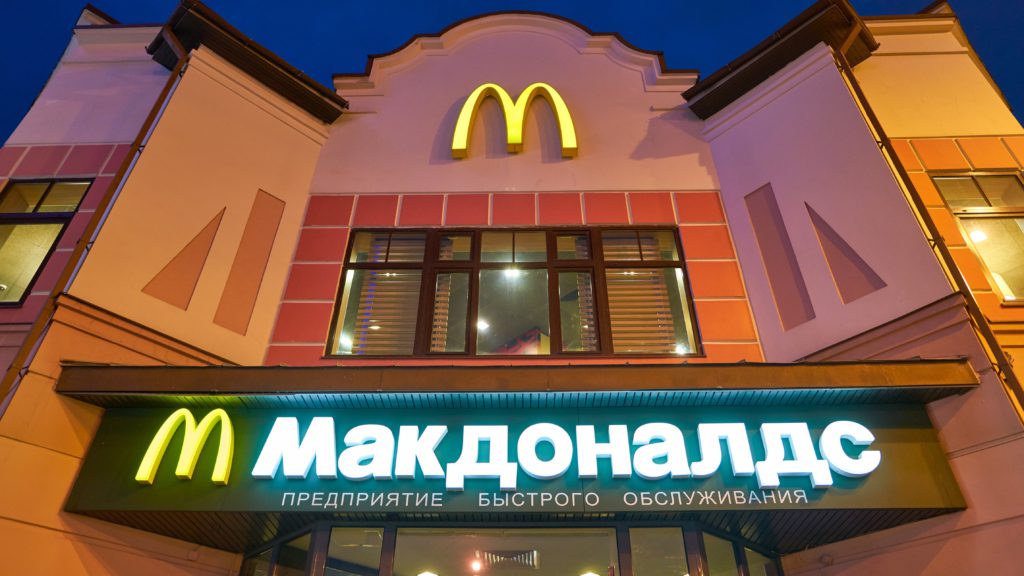Ex-coal miner buying McDonald’s in Russia is rebranding an Era

Alexander Govor, the McDonald’s Corp. franchisee who’s now bought the chain’s entire business in Russia, will have to create a new brand to replace the “Golden Arches” that came to symbolize his country’s embrace of capitalism during the Soviet Union’s collapse.
McDonald’s agreed this week to sell its network of 850 restaurants to the former Siberian coal mine owner, saying it would “de-Arch” Russia’s largest fast-food chain after it decided to leave the market in response to President Vladimir Putin’s invasion of Ukraine.
Ever since hours-long lines formed at the opening of the first McDonald’s restaurant on Moscow’s Pushkin Square in 1990, its presence in Russia took on a meaning beyond a meal. Given the grim reputation of Soviet-era restaurants, the fact that Russian consumers could get a Big Mac and fries that was indistinguishable from the same order in Nebraska – and served with a smile – was seen as a minor miracle.
The fast-food chain was credited with sparking a revolution in Russia’s service industry as capitalism took hold in the former Communist superpower. The brand’s spread after the end of the Cold War even spawned a theory, since debunked, that countries hosting McDonald’s restaurants didn’t go to war with each other.
“It is impossible to ignore the humanitarian crisis caused by the war in Ukraine,” McDonald’s Chief Executive Officer Chris Kempczinski said in a letter to company employees this week. “And it is impossible to imagine the Golden Arches representing the same hope and promise that led us to enter the Russian market 32 years ago.”
Coking coal
Govor made his fortune in mining as the co-owner of Yuzhkuzbassugol, one of Russia’s biggest coking coal producers, which he acquired during the controversial privatizations in the early 1990s. He controlled the miner together with Evraz, the steelmaker part-owned by Russian billionaire Roman Abramovich, until the group bought out Govor and his business partners after two fatal explosions in 2007.
Govor invested the proceeds in Yaisky refinery in Kemerovo region, which was built from scratch and started operations in 2013. Two years later, the businessman became McDonald’s franchisee partner and operates 25 restaurants.
While Exxon Mobil Corp. and the automaker Renault SA may record bigger losses than the $1.2 billion to $1.4 billion that McDonald’s said it will write off when leaving Russia, the company’s exit is perhaps the most visible sign of the exodus of nearly 1,000 foreign firms from the Russian market since the start of the war.
Govor is taking over the restaurants that employ 62,000 people and will have to change the chain’s name and menu. Most of the stores have been closed since March after McDonald’s announced it would temporarily halt operations over the war.
His Inrusinvest holding company did not immediately respond to a request for comment.
After the deal was announced, Russia’s Industry Ministry solicited proposals on its Telegram account for a new brand name and said it would send the most creative to the new owner. Among the suggestions were Rusburger, MacDon and Zburger, a reference to a symbol supporting the Russian invasion.
It’s unrealistic to expect to reproduce McDonald’s very low-cost offering in Russia within a few years because local companies lack the experience and technical know-how, Mikhail Goncharov, founder of the rival Teremok fast-food chain, said in a March 18 interview with The Bell news site. While there’ll be fast-food alternatives in Russia, “it’s a question whether there’ll be a place to eat at the same prices,” he said.
{{ commodity.name }}
{{ post.title }}
{{ post.date }}




Comments